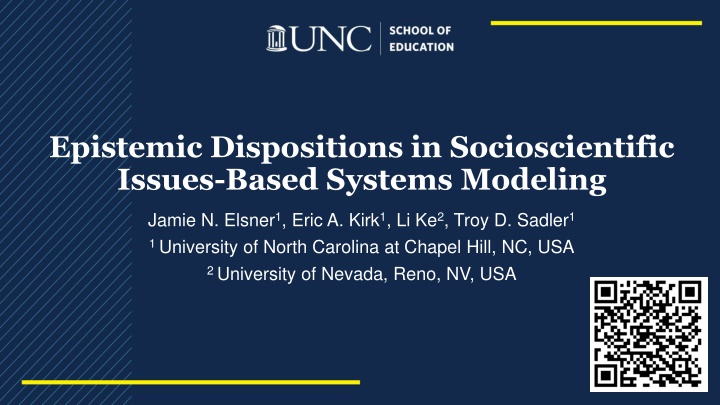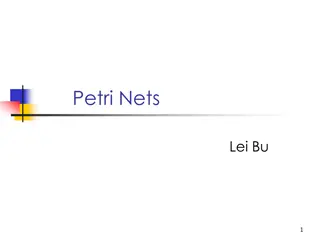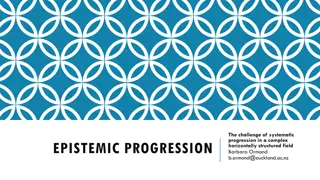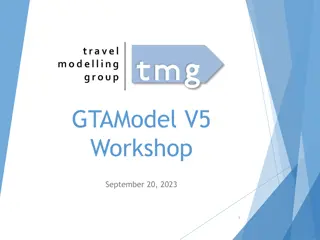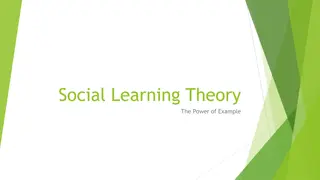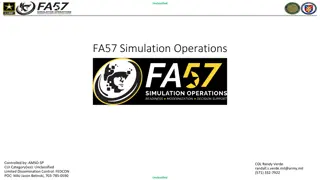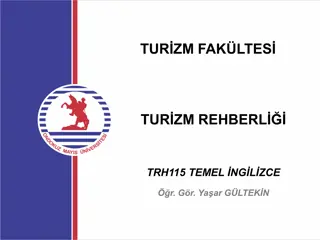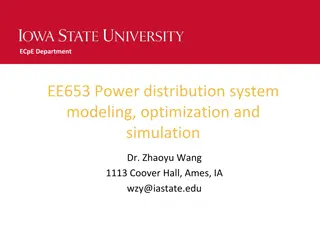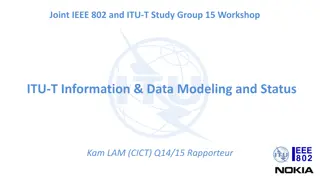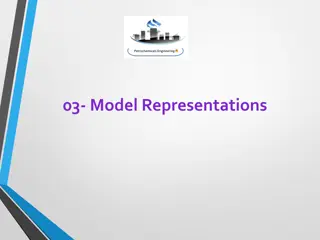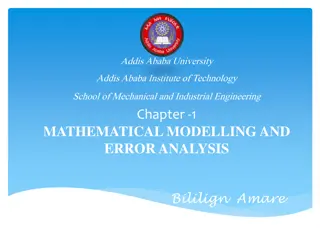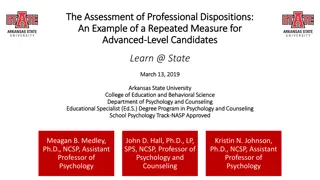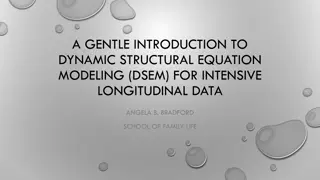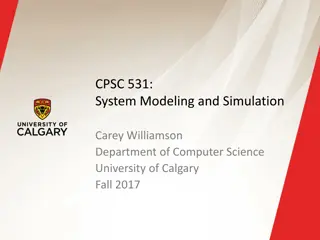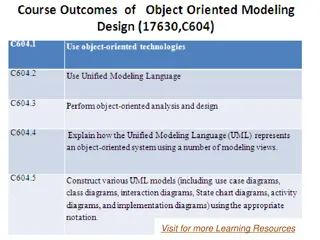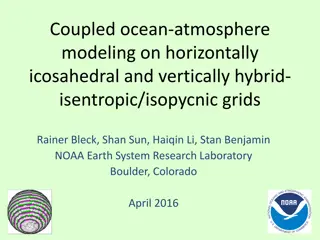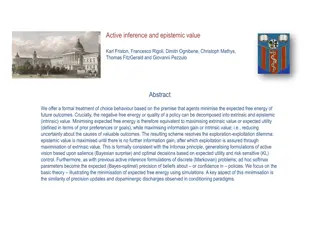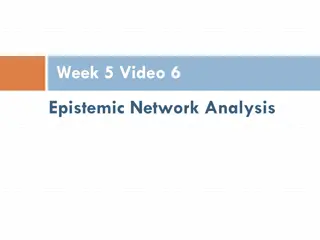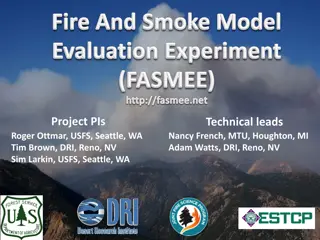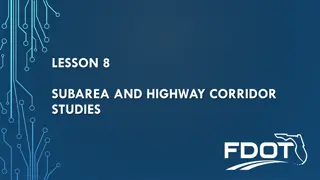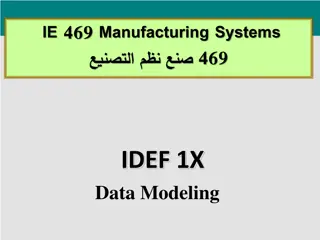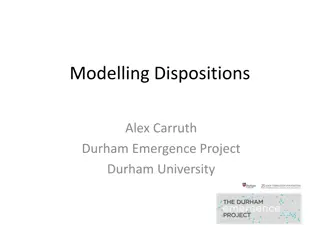Epistemic Dispositions in Socioscientific Systems Modeling
Socioscientific issues involve complex societal problems with ethical dilemmas, requiring reasoned analysis using scientific evidence. Modeling as a scientific practice aids in understanding SSIs and enhancing science curriculum goals through systems thinking and epistemic practices.
Download Presentation

Please find below an Image/Link to download the presentation.
The content on the website is provided AS IS for your information and personal use only. It may not be sold, licensed, or shared on other websites without obtaining consent from the author.If you encounter any issues during the download, it is possible that the publisher has removed the file from their server.
You are allowed to download the files provided on this website for personal or commercial use, subject to the condition that they are used lawfully. All files are the property of their respective owners.
The content on the website is provided AS IS for your information and personal use only. It may not be sold, licensed, or shared on other websites without obtaining consent from the author.
E N D
Presentation Transcript
Epistemic Dispositions in Socioscientific Issues-Based Systems Modeling Jamie N. Elsner1, Eric A. Kirk1, Li Ke2, Troy D. Sadler1 1 University of North Carolina at Chapel Hill, NC, USA 2 University of Nevada, Reno, NV, USA
Socioscientific Issues (SSIs) Complex problems of society with ethical dilemmas1 Ex: climate change, food deserts, antibiotic resistance, viral pandemics Reasoned about using scientific concepts and evidence No simple solution Students must think about the issue from multiple dimensions Modeling is a scientific practice that can support understanding of SSIs 2
Goals for Science Curriculum We need to tools to help students learn how to perform science practices but also learn how science is generated and ultimately accepted2,3 Via social discourses and community knowledge building Modeling is one of the NGSS science practices that can support this goal Helps students explain science concepts and make predictions Diagrams, drawings, simulations, other representations Systems modeling can help students think about how sub- components in a system are related Cross-cutting concept that unites disciplines 3
Systems Modeling of SSIs Assessing how factors are related is difficult for students4 Especially indirect relationships and factors that have multiple causes5 4
Epistemic Practices They way students propose, communicate, evaluate, and legitimize knowledge claims8 Collaborative process that occurs through social interactions Improves the quality of students arguments and explanations6,7 Modeling is an epistemic practice 5
Framework Epistemic Dimension8 Examples of Epistemic Operations9 Proposing Knowledge Proposing explanations, proposing causal relationships, inferring the scope of a decision Communicating Knowledge Persuading other group members Evaluating Knowledge Contrasting claims with evidence, acknowledging the absence of data Legitimizing Knowledge Building consensus, recognizing the value of other positions 8Kelly and Licona (2018) 9Casas-Quirogas and Crujeiras-P rez s (2020) 6
Research Questions 1) Which epistemic dimensions do students demonstrate during SSI-based systems modeling? 2) Which epistemic operations do students perform during SSI-based systems modeling? 3) What interactional operations do students engage in during SSI systems modeling? 7
Participants 6 students: Avery, Olivia, Leah, Audrey, Daniela and Brianna 4 high school seniors and 2 college undergraduates 2 bilingual in Spanish and English Students worked in pairs 8
Data Analysis Informed by two frameworks: Kelly and Licona (2018) and Casas-Quirogas and Crujeiras-P rez s (2020) Determine the distinct epistemic operations students perform during systems modeling Open-coded transcripts from modeling sessions Ultimately developed a full codebook (See conference paper) 9
R1: What epistemic dimensions did students demonstrate? Proposing knowledge, evaluating knowledge, and legitimizing knowledge Did not see evidence of communicating knowledge Students in our study were engaging in argumentation 10
R2: Proposing Knowledge Operations Epistemic Operation Student Example Proposing a factor Maybe we could put like education. (Leah) Proposing an explanation [Globalization factor added to model] because we're doing air travel and trading with other countries. (Leah) Proposing a correlation Well, I guess you could also think about the economy, like when people weren't working, unemployment rates were higher. (Leah) Proposing a societal implication [Students discuss pros and cons of the financial impact of COVID] I feel like it [budgeting] could be a good and bad thing, because for some people who were helped by the emergency grants, they had a little bit more room. (Brianna) And they probably saved it. (Daniela) Yeah, but then there s people who were unemployed, and even the grants weren t enough to hold them. (Brianna). 11
R2: Evaluating Knowledge Operations Epistemic Operation Student Example Evaluating claim I was just thinking there's a big like learning deficit [factor added to model] for like kids. (Olivia) True, because of virtual school, because of the lack of relationships with their teachers. (Avery) Acknowledging limited understanding [Avery and Olivia discuss mental health concerns] I don't know yet. Just write it down and then we can think about it. (Avery) 12
R2: Legitimizing Knowledge Operations Epistemic Operation Student Example Building Consensus [Avery proposes that hospitals had a lack of resources] Actually, you could connect those then. (Olivia) Okay, yeah. (Avery) [Avery connects lack of resources factor to hospitals factor] Recognizing the value of other positions [Brianna discusses how unemployment grants helped her mom financially during the pandemic] I know you meant the unemployment with your mom was like more [money] than what we were getting before. I know they gave out a lot of, um, emergency grants that really helped, like that was the most [money] you really had in a minute. (Daniela) 13
R3: Interactional Operations Excerpt Interactional Operation Daniela And so you want another one to be like mortality rates? Seeking advice Brianna Daniela Brianna Uh, yeah, could you write that? Okay, I don't know where to write in this. Just pull it out. Yeah. Mortality, okay, what do you want to say about that? Assigning task Verbalizing task Verbalizing task Daniela Coordinating language Um, I know that I did have family members who passed away in other countries and you're not able to travel. Brianna Oh, that could be another one, traveling, and then do you want me to put mortality rates under traveling? Daniela Seeking advice 14
Summary Systems modeling is a tool to support students in recognizing the complexity of a SSI. Students: Linked different components of a system Considered how science related to society Assessed the truthfulness of knowledge claims Students reflected on their own experiences and validated the experiences of others We identified the distinct epistemic operations that supported students sensemaking around complex SSIs 15
Implications Established a taxonomy of talk that is the first step towards identifying patterns and characteristics of high-quality modeling conversations Students engaged in back-and-forth process of knowledge construction appropriate science practice8 Supported epistemic agency students were positioned to collaboratively construct knowledge9 16
References 1. Zeidler, D. L., Herman, B. C., & Sadler, T. D. (2019). New directions in socioscientific issues research. Disciplinary and Interdisciplinary Science Education Research, 1(1), 1-9 2. Aleixandre, M. P. J., & Crujeiras, B. (2017). Epistemic practices and scientific practices in science education. In Science education (pp. 69-80). Brill. 3. Duschl, R. (2008). Science education in three-part harmony: Balancing conceptual, epistemic, and social learning goals. Review of research in education, 32(1), 268-291. 4. Yoon, S. A., Goh, S. E., & Park, M. (2018). Teaching and learning about complex systems in K 12 science education: A review of empirical studies 1995 2015. Review of Educational Research, 88(2), 285-325. 5. Hmelo-Silver, C. E., Marathe, S., & Liu, L. (2007). Fish swim, rocks sit, and lungs breathe: Expert-novice understanding of complex systems. The Journal of the Learning Sciences, 16(3), 307-331. 6. Nussbaum, E. M., Sinatra, G. M., & Poliquin, A. (2008). Role of epistemic beliefs and scientific argumentation in science learning. International Journal of Science Education, 30(15), 1977-1999. 7. Ryu, S., & Sandoval, W. A. (2012). Improvements to elementary children's epistemic understanding from sustained argumentation. Science Education, 96(3), 488-526. 8. Dijk, E. M. V. (2011). Portraying real science in science communication. Science Education, 95(6), 1086-1100. 9. Gonz lez Howard, M., & McNeill, K. L. (2020). Acting with epistemic agency: Characterizing student critique during argumentation discussions. Science Education, 104(6), 953-982. 17
Acknowledgements Name: Jamie Elsner Email: jelsner@unc.edu Paper & slides can be found at: https://tarheels.live/seel/publications/conference-presentations/ This material is based upon work supported by the National Science Foundation under Grant DRL-2023088. Any opinions, findings, and conclusions or recommendations expressed in this material are those of the author(s) and do not necessarily reflect the views of the National Science Foundation."
